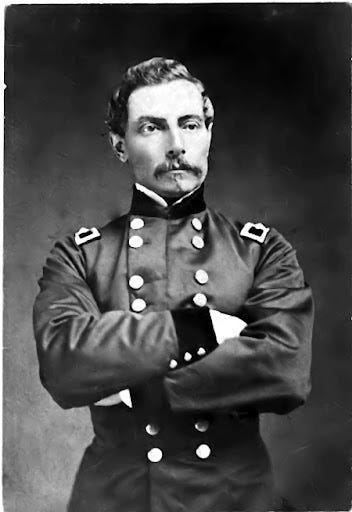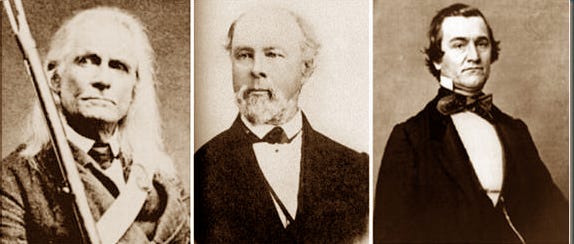(Another time travel “interview”)
After ascending the long, winding marble stairway to the second floor a cavalry officer, decked out in full-dress uniform, courteously pointed me to the President’s office. The door was partly open and I could see Davis, standing at a window gazing out at the live oaks. A gentle puff of wind moved the curtain. I knocked.
“Well,” he said turning toward the door. “If you’re another jackass office-seeker go back to your hotel. If you’re not, you can come in but you better have some good news.” We sat on opposite sides of his desk.
ME: “You sent me this telegram, Mr. President. Thank you on behalf of my readers for granting me an interview.”
JD: “That’s right. Yes, I remember that. Sorry if I seemed off-putting but I have an endless parade of self-seeking hustlers all over this damned town trying to weasel appointments out of me. Hard to be diplomatic even if I feel like it, which I almost never do.”
ME: “I left Charleston yesterday, sir. What do you think of Sumter now being back in Confederate hands.”
JD: “Well, it’s a pile of rubble now, isn’t it. I gave Beauregard the order to make it so.”
ME: “I watched the bombardment from Battery Point. Very impressive.
JD: “You get to see Beauregard?”
ME: “Not up close. After the fort surrendered they had a big party at one of the waterfront estates. Uniformed soldiers. Lots of pretty girls in perky riding attire wearing Jockey caps. Lots of whiskey. Band playing ‘Bonnie Blue Flag’ and ‘Dixie’. The general gave some speeches.”
JD: “I‘ll just bet he did. If I had to guess, I’d say he gave his soldiers a meager share of the credit he reserved for himself.”
ME: “That would be a safe guess, Mr. President.”
JD: “I can see him now … little Bory, puffed up with noblesse oblige and self-effacement. Stumbling all over himself with feigned humility. He thinks I’m less of a West Point general than he is. I assure you he’s wrong.”

ME: “I take it you and the general don’t get along.”
JD: “He can’t stand me, frankly, and the feeling’s mutual but he’s a general and I need him for the coming invasion.”
ME: “Do you think the Confederates can win the war?”
JD: “Look, I told Lincoln I didn’t want any damned war, that we just wanted to be left alone. Now he’s made me blow up Sumter. What the hell’s wrong with him?
ME: “Search me, Mr. President. Maybe he’s just enhancing his resume. Nobody seems to like him and he doesn’t seem to care.”
JD: “So, I assume you’re here to find out what our new government is up to. Well, let me be brief. I can’t tell you. If I did tell you this whole enterprise might fall apart. If word ever got out what these hot-headed politicians are doing here some of our beloved Confederate states might well secede from the Confederacy itself. Arkansas is already threatening. Tennessee’s even worse.”
ME: “How about if we keep it off the record?”
JD: “Okay. But if I see it on the record I’ll tie your neck in a knot. Maybe before I shoot you.”
ME: “Understood. So then who among your government is posing a threat?”
JD: “I’ll begin with Alexander Stephens, our esteemed vice president. He has said he won’t leave Georgia and move to Richmond when the capitol goes there next month. The reason is because he hates me and makes no bones about it. He refuses to serve or even to take up residence in any state where I am. Little Alex is a spiteful man. And he’s only one problem.”
ME: “Who else?”
JD: “Good God! Where to start? How about Robert Barnwell Rhett, publisher of the Charleston Mercury! Everything I do he refers to as a fool’s errand. And he does so publicly, in his damned newspaper. Then you have the fire-eating idealist, Edmund Ruffin, one of Virginia’s finest, and Alabama’s William Yancey, who single-handedly caused the Democrats to split which led to Lincoln being President. And you want a real troublemaker? Try Louis Wigfall, zealot senator and perpetual drunk from Texas known for fistfights, whoring around and fighting duels with pistols. He hates my guts and tries to undermine everything I attempt. I could go on but I won’t. It would be superfluous.”

ME: “What do you think can be done to foster harmony?”
JD: “Hell if I know. Maybe nothing. Maybe diplomacy plus a lot of arm-twisting, seasoned with equal amounts of ass-kicking and whiskey. Try to imagine a chamber crowded with bull-headed politicians, loudly proposing and counter proposing and voting down whatever the hell they don’t like even though it would benefit the government as a whole. And then imagine the entire lot of them champing at the bit to get over to the Excelsior Hotel by five o’clock to chase women and get drunk. The prostitutes are having a field day. So you see why we have to be circumspect.”
ME: “Yes sir. That must be difficult. I’m sure it can try your patience.”
(Davis rested both elbows on his desk and leaned forward. He spoke slowly and earnestly.)
JD: “It’s not just my patience that’s being tried. Look, this is not something I ever asked for. When I left the United States Senate, I just wanted to go back home to Mississippi and take care of my people and plant my cotton. But, no, no, no, the Assembly elected me to be President. And they did that without my knowledge or my consent. Hard to believe but I accepted. Sense of duty I suppose. But don’t doubt me … I’m going to lead this nation to victory in spite of having to deal with these knuckleheads of special interests and a bunch of creative generals from West Point..”
ME: “Thank you, Mr. President, for being candid.”
JD: “Yes. Now, I’m sorry to have to cut this short, but if you’ll excuse me, my wife has insisted that I attend another of these gussied-up parties, amusing dignitaries and wealthy seekers of privilege and assorted hangers on who comprise the bulwark of our new and struggling Confederate state. Duty calls, you know.”







